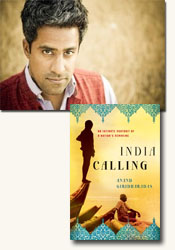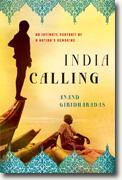author interview
book reviews:
· general fiction
· chick lit/romance
· sci-fi/fantasy
· graphic novels
· nonfiction
· audio books
· author interviews
· children's books @
curledupkids.com
· DVD reviews @
curledupdvd.com
newsletter
win books
buy online
links
home
for authors
& publishiss
for reviewers

|
|||||

Anand Giridharadas is an American-born son of parents who emigrated to the United States from India in the 1970s. After graduating from the University of Michigan in 2003, Giridharadas went to India to first work for McKinsey & Company, the management consulting firm, and then to write about India for The New York Times and The International Herald Tribune. Now back in the U.S., Giridharadas has published his first book,
India Calling: An Intimate Portrait of a Nation's Remaking Interviewer Ram Subramanian: There have been several books in recent times (Edward Luce’s In Spite of the Gods, William Dalrymple’s Nine Lives) that have attempted to look at the changes in India. What motivated you to revisit that topic and what was your main objective in doing so? Anand Giridharadas: In the six years that I spent in India (2003-2009), I realized that I was in the middle of a revolution. This was not like the current revolutions in Egypt and Tunisia, in that this was a revolution of a quiet, forceful kind. Moreover, this was a revolution not of a group, but of one person at a time. I was not interested in the macro approach – that has been done before – but more in what the revolution meant to individuals. I used that as the central theme that drove the book. The idea of “ambient love” is brilliant because it captures, in the same frame, both the singularity of family life in India as well as its ability to stifle individuality. The tensions inherent in the young people portrayed in the book seem to stem from their need to break away from their family’s “ambient love.” At what point in your reporting did “ambient love” appear to you as probably the strongest tether that seems to hold back India’s youth? During my visits to India as a child, I always resented that fact that there was almost no privacy. I couldn’t talk alone to my sister or my parents when in India. We were always surrounded by a large number of relatives and there was no “private space” to speak of. I didn’t start out my research with this notion of “ambient love” but as I talked to people – both young and old – I realized that ambient love was both a safety net and a tether that held back individuality and personal choice. The book’s narrative structure often contrasts what you saw in India with what you grew up with in the U.S. and your own grandparents’ life in India. Was that done deliberately so that you could understand the changes in a more personal way? A reviewer referred to my description of my parents’ and grandparents’ India of the past as a “monochrome snapshot” and my portrait of current India as a “technicolor” picture. My rationale for this kind of a narrative structure was, in effect, to tell the Western reader, “come with me and make this journey to learn what has changed in India.” I wanted the reader to discover these changes as I was discovering them and for that the past provided the context. V.S. Naipaul spoke of a “million mutinies” (India: A Million Mutinies Now, 1991) happening, albeit in a different context, in India. Do you see these myriad individual personal battles of people such as Ravindra (whose vignette forms an entire chapter in the book and was excerpted in a recent issue of The New York Times Sunday magazine) and others adding up to a significant and permanent social change in India? The “mutinies” that Naipaul referred to were about what he calls “rejecting rejection.” It was about caste and how India’s caste system held back the individual and the “mutinies” against such a system. My book is about the social revolution that is caused by the economic changes and not so much about the caste system. The thing about the revolution in India is that, unlike those in China and Russia that were tremendously disruptive, this is a slower revolution (in relative terms) because those revolting are not throwing off the shackles of the past right away, but, instead, are carefully examining the relevance of the past to current changes, and are making the change rather slowly and deliberately. It remains to be seen whether this will amount to a more permanent change because the past still holds sway to a lot of Indians. In visiting your website, it appears that you are now a full-time doctoral student at Harvard. Do you have any future books in mind or are you likely to be preoccupied with your studies for quite some time? No, I am a full-time writer and a part-time doctoral student. I plan on continuing my writing. I have an idea for my next book but I am not in a position to talk about it now.
|
|||||
| fictionnsf/f · comic books · nonfiction · audio newsletter · free book contest · buy books online review index · links · · authors & publishiss reviewerss |
|
| site by ELBO Computing Resources, Inc. | |


